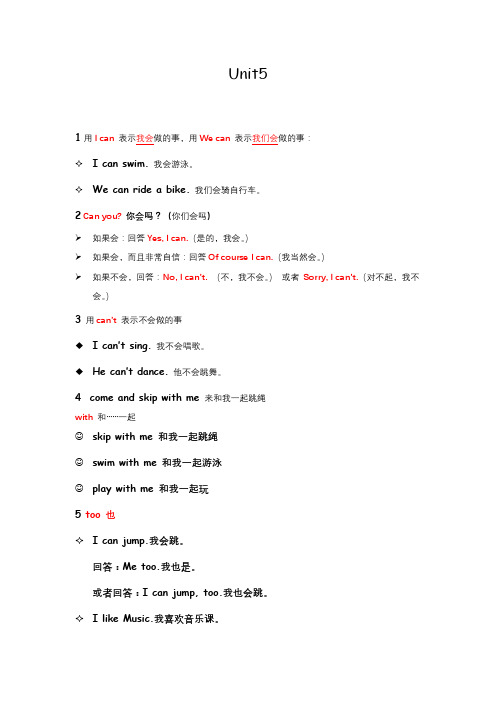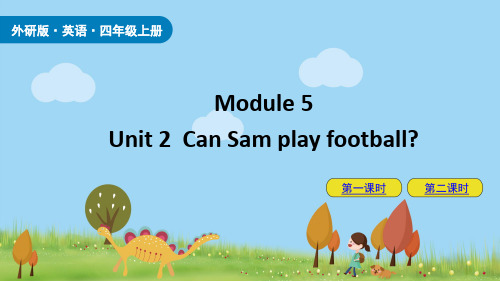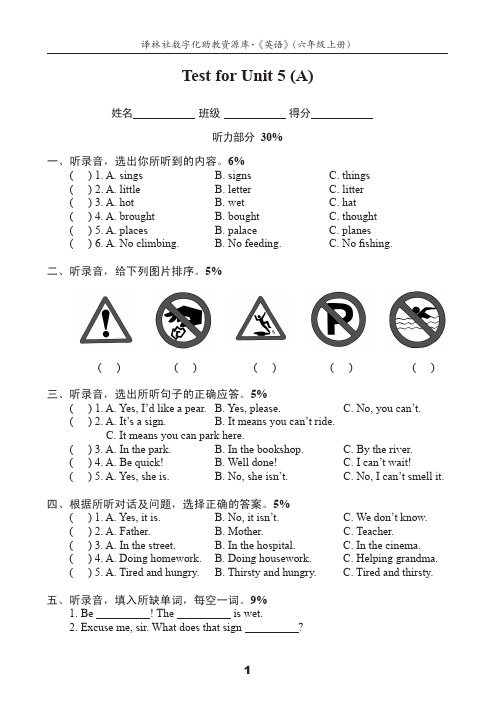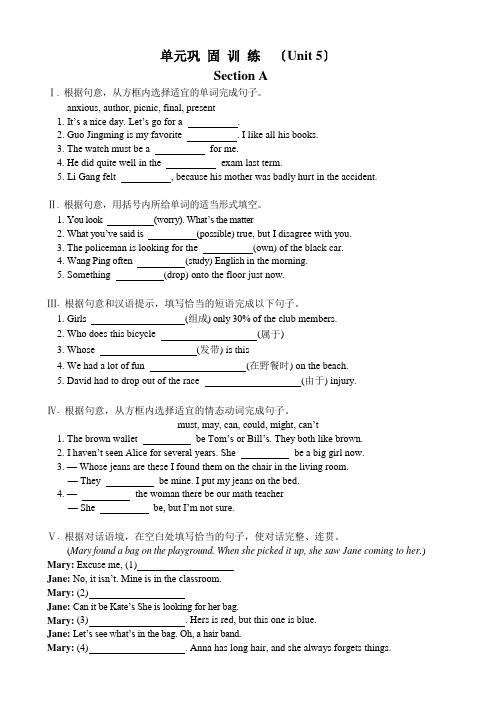U5 We can do it
- 格式:ppt
- 大小:3.91 MB
- 文档页数:26

Test for Unit 5 (A)姓名班级得分听力部分30%一、听录音,选出你所听到的内容。
(听两遍)10%( ) 1 A parents B presents C people( ) 2 A sweet B sleeping C sweeping( ) 3 A ready B ride C rice( ) 4 A check B children C clothes( ) 5 A ship B show C shop( ) 6 A grow B go away C giraffe( ) 7 A get off B get on C get to( ) 8 A by bike B by plane C by metro( ) 9 A turn left B turn right C take the car( ) 10 A make the cake B make the salad C make the bed二、根据所听内容,给下列图片标序号。
(听两遍)5%A B C D E( ) ( ) ( ) ( ) ( )三、听录音,判断所听内容与图片是否相符,用“√”或“×”表示。
(听两遍)5%1 2 3 4 5( ) ( ) ( ) ( ) ( )四、听录音,选择合适的应答句。
(听两遍)10%( ) 1 A I like washing clothes. B We are cleaning the library.C I can sweep the floor.( ) 2 A She cooks dinner in the kitchen. B He is sleeping in the bedroom.C She is making a cake.( ) 3 A I have a headache. B She has a toothache.C Her ear hurts.( ) 4 A You should brush your teeth. B You should take some medicine.C You shouldn’t watch TV.( ) 5 A She is singing in the music room. B They’re singing together.C She is singing ABC Song.笔试部分70%一、根据句意和图片内容填写单词。

Unit51用I can表示我会做的事,用We can表示我们会做的事:✧I can swim.我会游泳。
✧We can ride a bike.我们会骑自行车。
2Can you?你会吗?(你们会吗)➢如果会:回答Yes, I can.(是的,我会。
)➢如果会,而且非常自信:回答Of course I can.(我当然会。
)➢如果不会,回答:No, I can’t. (不,我不会。
)或者Sorry, I can’t.(对不起,我不会。
)3用can’t表示不会做的事◆I can’t sing.我不会唱歌。
◆He can’t dance.他不会跳舞。
4come and skip with me 来和我一起跳绳with和……一起☺skip with me 和我一起跳绳☺swim with me 和我一起游泳☺play with me 和我一起玩5 too 也✧I can jump.我会跳。
回答:Me too.我也是。
或者回答:I can jump, too.我也会跳。
✧I like Music.我喜欢音乐课。
回答:Me too.我也是。
或者回答:I like Music, too. 我也喜欢音乐课。
6 like a bird in spring 像春天的小鸟拓展:sing like a bird 像小鸟一样唱歌 swim like a fish 像鱼儿一样游泳7 Can you skate? 你会滑冰吗?Can you ride a bike? 你会骑自行车吗?8 I can skip. How about you? 我会跳绳。
你呢?回答: I can swim. 我会游泳。
(提醒:这里的How about you?其实在问你会什么?)。


Test for Unit 5 (A)姓名班级得分听力部分 30%一、听录音,选出你所听到的内容。
6%( ) 1. A. sings B. signs C. things( ) 2. A. little B. letter C. litter( ) 3. A. hot B. wet C. hat( ) 4. A. brought B. bought C. thought( ) 5. A. places B. palace C. planes( ) 6. A. No climbing. B. No feeding. C. No fishing.二、听录音,给下列图片排序。
5%( ) ( ) ( ) ( ) ( )三、听录音,选出所听句子的正确应答。
5%( ) 1. A. Yes, I’d like a pear. B. Yes, please. C. No, you can’t.( ) 2. A. It’s a sign. B. It means you can’t ride.C. It means you can park here.( ) 3. A. In the park. B. In the bookshop. C. By the river.( ) 4. A. Be quick! B. Well done! C. I can’t wait!( ) 5. A. Yes, she is. B. No, she isn’t. C. No, I can’t smell it.四、根据所听对话及问题,选择正确的答案。
5%( ) 1. A. Yes, it is. B. No, it isn’t. C. We don’t know.( ) 2. A. Father. B. Mother. C. Teacher.( ) 3. A. In the street. B. In the hospital. C. In the cinema.( ) 4. A. Doing homework. B. Doing housework. C. Helping grandma.( ) 5. A. Tired and hungry. B. Thirsty and hungry. C. Tired and thirsty.五、听录音,填入所缺单词,每空一词。

单元巩固训练〔Unit 5〕Section AⅠ. 根据句意,从方框内选择适宜的单词完成句子。
anxious, author, picnic, final, present1. It’s a nice day. Let’s go for a .2. Guo Jingming is my favorite . I like all his books.3. The watch must be a for me.4. He did quite well in the exam last term.5. Li Gang felt , because his mother was badly hurt in the accident.Ⅱ. 根据句意,用括号内所给单词的适当形式填空。
1. You look (worry). What’s the matter2. What you’ve said is (possible) true, but I disagree with you.3. The policeman is looking for the (own) of the black car.4. Wang Ping often (study) English in the morning.5. Something (drop) onto the floor just now.Ⅲ. 根据句意和汉语提示,填写恰当的短语完成以下句子。
1. Girls (组成) only 30% of the club members.2. Who does this bicycle (属于)3. Whose (发带) is this4. We had a lot of fun (在野餐时) on the beach.5. David had to drop out of the race (由于) injury.Ⅳ. 根据句意,从方框内选择适宜的情态动词完成句子。

一、重点短语1.让我们做某事let’s do sth2.我最喜爱的动物my favorite animals3.有点有趣kind of interesting4.两条腿走路walk on two legs5.你为什么不做某事呢?why don’t you do sth?6.整天睡觉sleep all day7.南非二、重点句型1.让我们先去看熊猫吧!Let’s see the pandas first.2.它能用两条腿走路。
He can walk on two legs.3.因为它有点无聊。
Because she’s kind of boring.4.你为什么不喜欢老虎呢?Why don’t you like tigers?5.你为什么喜欢熊猫?因为他们很可爱。
Why do you like pandas. Because they’re very cute.6.狮子来自哪里?他们来自南非。
Where are lions from? They’re from South Africa.一、重点短语1. 拯救大象save the elephants2. ...的象征a symbol of...3. 走很长时间walk for a long time4. 迷路get lost5. 有食物和水的地方places with food and water6. 帮助他们生存help them to live7. 处于危险之中;濒临灭绝be in great danger8. 砍树cut down trees9. 失去他们的家园lose their home10. 因某物杀害某人/某物kill sb/sth for sth11. 由...制成be made of12. 大象日Elephant Day二、重点句型1. 你喜欢什么动物?What animals do you like?2. 我们是来自泰国的学生,我们像拯救大象。
知识归纳与拓展【单词分析】1.wild (adj.)野生的wild animals (n.)自然环境,野生状态in the wild2.free (adj.) 自由的,不受拘束的be free to do sth.自由的做某事for free 免费的3.die (vi.) 死dead (adj.) 死的dying (adj.)奄奄一息的death (n.) 死,死亡Eg:His father died last week.She cried out after knowing his husband's death.He found a dead bird in the garden.The dying man was saved by a kind-hearted lady.4.mean (vt.) 意思是,意味着meaning (n.) 意思meaningful (adj.)有意义的meaningless (adj.) 无意义的Eg:What’s the meaning of the word?= What does the word mean?5.born (adj.) 出生的be born birth (n.) 出生at birthEg: I weighed four kilos when I was born.= I weighed fours kilos at birth.4.beginning (n.) 开始,起初begin (vt.&vi.) 开始开始in the beginning =at first ; 在……的一开始at the beginning of ……;开始做某事begin to do = begin doing一开始, 起初(at first) in the beginning不与of连用。
◇at the beginning 常与of 连用,表“在…之初”◇at the beginning 也可单独使用,表示“起初,5.sad(adj.) 伤心的sadly (adv.) 令人伤心地sadness (n.)伤心sadly = to one’s dnessEg:Sadly, both he and my mother died of cancer6.mainly( adv.) 主要地,大部分main (adj.) 主要的Eg:Deer live mainly in forests7.danger (n.) 危险dangerous (adj.) 危险的Eg:He is in danger of losing his job if he goes on like this.The sick person is now out of danger.Shooting off fireworks can be dangerous.8.action (n.) 行动;行为act (vt.& vi.) 行动,表演active (adj.) 积极的,活跃的actively adv.积极地,活跃地take action to do sth.= act to do sth.9.closed (adj.) 关闭的; 紧密的,亲密的close (vt.&vi.) 关,关闭closely (adv.) 紧密地10.lost (adj.) 迷路的,迷失的lose (vt.) 遗失,失去get lost = lose one’s way11.the same ……as = as……as…..Eg:Y ou are as tall as me. = Y ou are the same height as me. (heavy,old,big / weight,age,size)12.hunter (n.) 猎人hunt (vt.& vi.) 打猎,猎杀13.1iving (n.) 生存,生计living (adj.) 活的,现存的live (vi.) 居住,生活14. sell的过去式sold;卖得好sell well;卖光sell out15.illness (n.) 疾病ill (adj.) 生病的ill和sick都是形容词,表示“生病的”,但二者有区别;ill只可作表语;而sick既可作表语,也可作定语.如:Eg:①He is ill / sick in hospital.他生病住院了.②He is a sick boy.(正)这男孩儿生病了. He is an ill boy.(误)16.because of+短语;because +句子Eg:I was late because of the heavy rain.= I was late because it rained heavily.17.accept(v.)接受,收到receive(v.)收到1)accept用作动词,意为“接受”,指经过考虑,由主观意志来决定接受,动作者本身是主动的He couldn't accept our advice but our gifts.他们不能接受我们建议但接受了我们的礼品。
四上U5必会词组:our new home 我们的新家 my skirts 我的短裙my white cap我的白帽子 under my table 在我的桌子下面behind the fridge 在冰箱后面 in the bathroom在卫生间里beside your clock 在你的钟旁边 in the kitchen 在厨房里love my bedroom 喜爱我的卧室 nice and clean 又好看又干净my little bedroom 我的小卧室I’d like = I would like 我想要like to fly my kite喜欢放我的风筝 like to ride my bike喜欢骑我的自行车come and look 过来看 {come and have a look 过来看一看}必会句型:1、Where is…? It is……在哪里?它在…例:Where is my bag? It is in your bedroom.2、Where are ? They are ……在哪里?它们在…例: Where are my skirts? They are in the living room, on the sofa.3、How are you? I’m hungry. 你好吗?我饿了。
注:“How are you?”常用于询问身体、学习等情况,回答较灵活,如“I'm fine/ very well/ OK.”等等4、Would you like……? Yes, please./ No, thank you.你想要……吗?是的,请。
/不,谢谢。
例:Would you like an orange? No, thank you. 你想要一个橙子吗?不,谢谢。
你想要一些梨吗?是的,请。
5、What about……?=How about……? ……怎么样?例:What about a hot dog? No,thank you. 来一个热狗怎么样?不要,谢谢你。